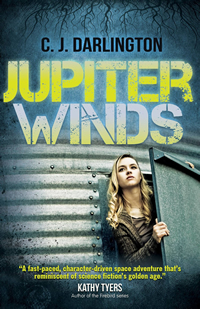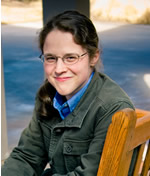5 Reasons Why We Love Dystopian Heroines
 EDITOR’S NOTE: C.J. Darlington knows what she’s talking about when she writes about dystopian heroines. Her latest novel, Jupiter Winds, features Grey Alexander who must cope with the dystopian world of 2160.
EDITOR’S NOTE: C.J. Darlington knows what she’s talking about when she writes about dystopian heroines. Her latest novel, Jupiter Winds, features Grey Alexander who must cope with the dystopian world of 2160.
No doubt all of us have heard or read at least one of the hot YA dystopian series hitting shelves in the past few years. And while dystopian certainly isn’t a new genre (think 1984 and Fahrenheit 451), it’s certainly gained a lot of steam with today’s culture. Some might say the genre’s star is fading, but one glance at the bestseller lists, and you’ll still find readers are devouring these YA novels, many featuring strong heroines.
What is it about The Hunger Games, Divergent, and many other similar novels that has spawned multimillion-dollar movie deals, thousand upon thousands of book sales, and rabid fans enthusiastically creating fan art and fan fiction?
I believe it’s because of their heroines.
Let’s face it. We’ve seen many of these plots before, but Katniss Everdeen and Tris Prior (and their like) spark something in readers. Here are 5 reasons why:
1. Their Strength
Today’s readers are looking for strong heroines who can take care of themselves. These gals don’t necessarily need someone to take care of them, though that doesn’t mean there aren’t times when people do.
2. Their Skills
Katniss is a skilled archer who can shoot a bow better than anyone else. Tris learns to fight hand-to-hand effectively. When we read about these girls, we want to be like them, whether it’s realistic or not.
3. They Have Vulnerabilities
An error some authors make in creating their heroines (and heroes for that matter) is to write a perfect person without any weakness. While Katniss and Tris are indeed strong, they aren’t perfect. This three-dimensional aspect is what allows us to suspend our disbelief easier when reading their stories. Plus we relate even more since who among us is perfect?
4. Their Hearts Aren’t Hard
Most of the evil in these books happens to the girls. They are thrust into situations against their will. If they kill, it is in self-defense. To survive. And both of them face at least one situation that nearly breaks them. After all, they are girls (both sixteen at the start of their books) thrust into a world most adult men and women couldn’t handle.
5. They Don’t Have Time for Bull
Excuse the language, but these are no-nonsense girls (and the novels are general market fare). Katniss and Tris say it like it is, the things we wish we could say. It gets them in trouble sometimes, but we cheer them on.
If you’ve read these stories, what about the heroines did you like? Why do you think the novels are so popular?
 A homeschool graduate, C.J makes her home in Pennsylvania with her family and their menagerie of dogs and a paint horse named Sky. C. J.’s newest novel Jupiter Winds is a YA/dystopian/space adventure.
A homeschool graduate, C.J makes her home in Pennsylvania with her family and their menagerie of dogs and a paint horse named Sky. C. J.’s newest novel Jupiter Winds is a YA/dystopian/space adventure.
To learn more about her, see her web site, and find her on Facebook, Twitter, Pinterest, and Goodreads.





























I read “The Hunger Games” but although I enjoyed the plot, I found I didn’t care enough about Katniss to continue reading her story in “Catching Fire” and “Mockingjay” (though I’ve enjoyed the movies and plan to see all of them). I didn’t finish “Divergent”, either…Tris bored me. I guess these aren’t the kinds of heroines that draw me, personally! I must be weird. I think it’s fascinating that dystopian heroines are a trend, though.
I’d like to devote a post about this topic. I was actually thinking that female heroines in fantasy mostly don’t work. But then I read C. J.’s excellent article and thought, Oh, yea. Dystopian fiction! Many of these stories feature young women. Even a couple epic fantasy stories do.
But I was thinking primarily of Christian fantasy which has a few titles which seemed as if they were an attempt to take fantasy to romance readers. Those didn’t work, I don’t think in large part because they didn’t satisfy fantasy readers—and perhaps fantasy readers never found them. So perhaps if they had female protagonists which were more like those C. J. describes . . . I wonder.
Becky